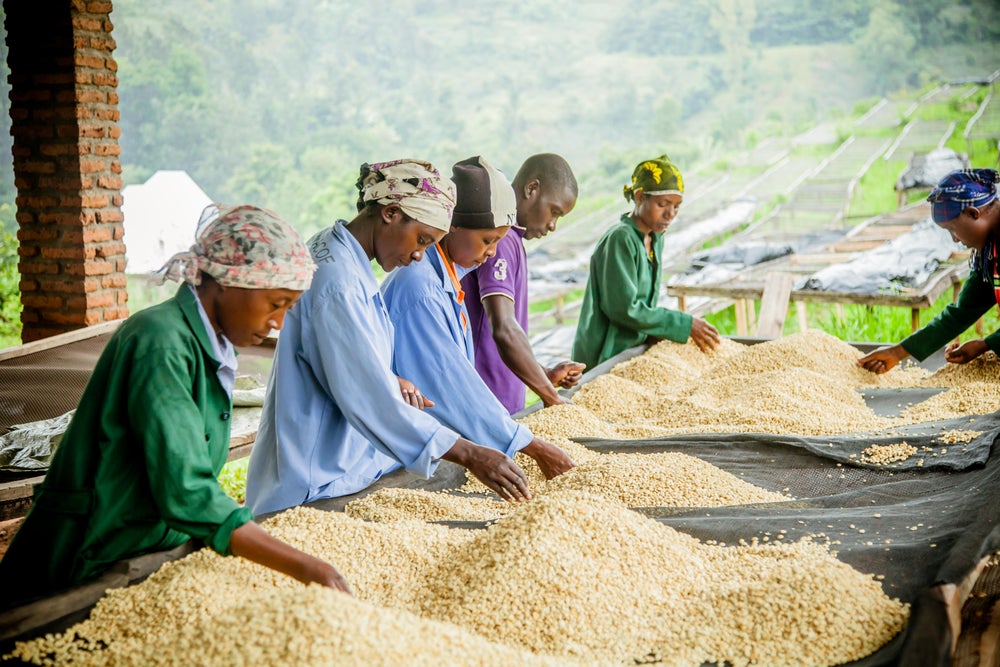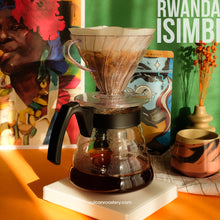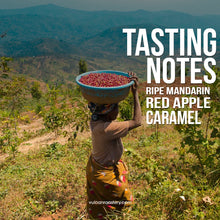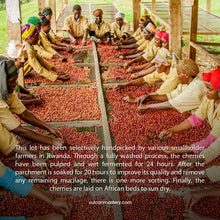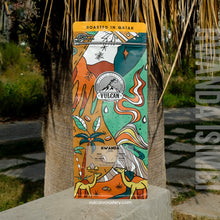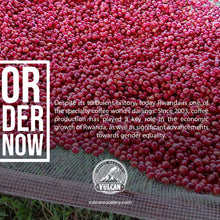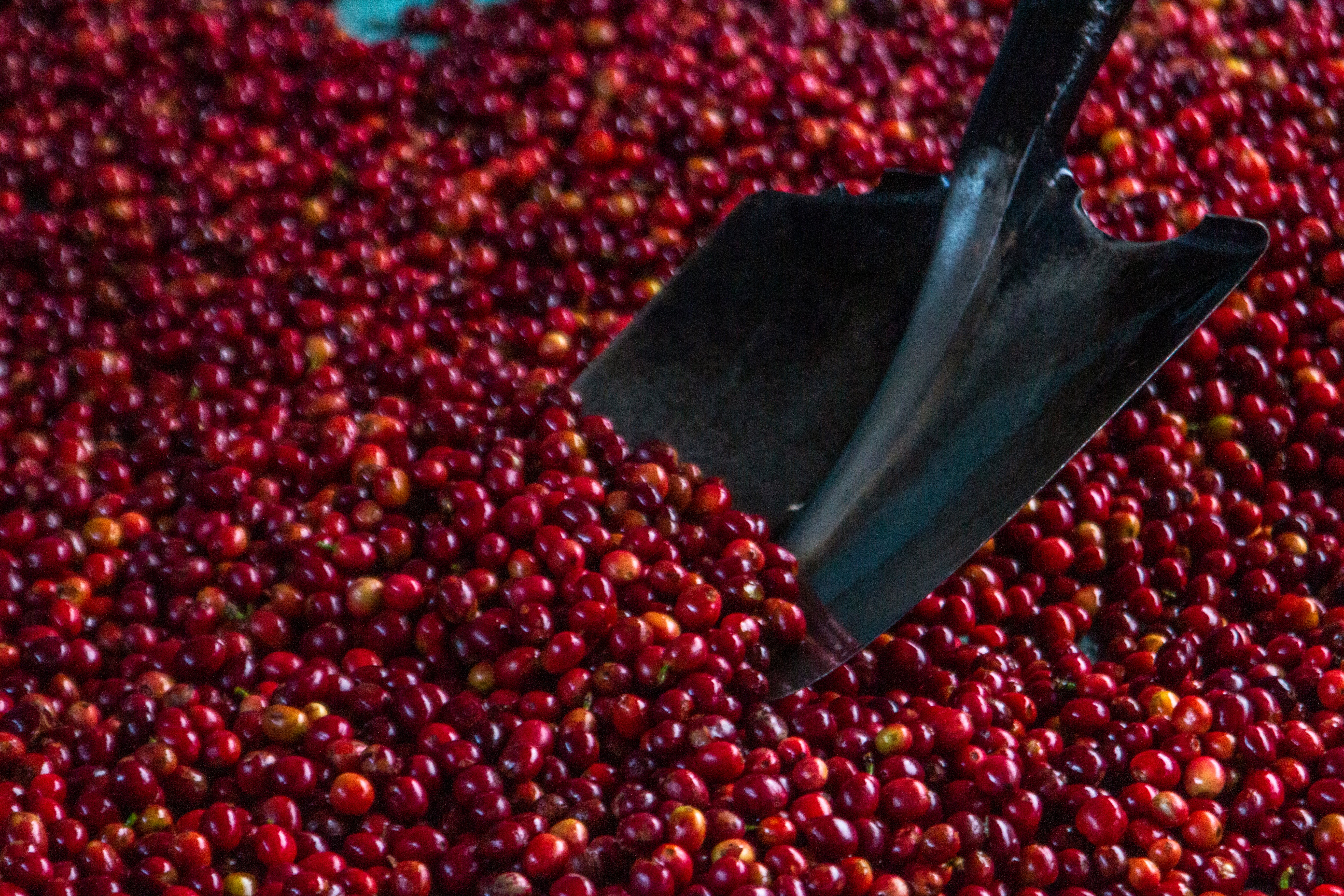
رواندا - إيسيمبي
على الرغم من تاريخها المضطرب، أصبحت رواندا اليوم واحدة من الدول المفضلة في عالم القهوة المتخصصة. منذ عام 2003، لعب إنتاج القهوة دورًا رئيسيًا في النمو الاقتصادي في رواندا، فضلاً عن التقدم الكبير نحو المساواة بين الجنسين.
المزرعة: مزارعين صغار متنوعين
الصنف: بوربون
المعالجة: مغسولة بالكامل
الارتفاع: 1100 إلى 2000 متر فوق مستوى سطح البحر
المنطقة: متنوعة
ملاحظات التذوق: اليوسفي الناضج، التفاح الأحمر، الكراميل
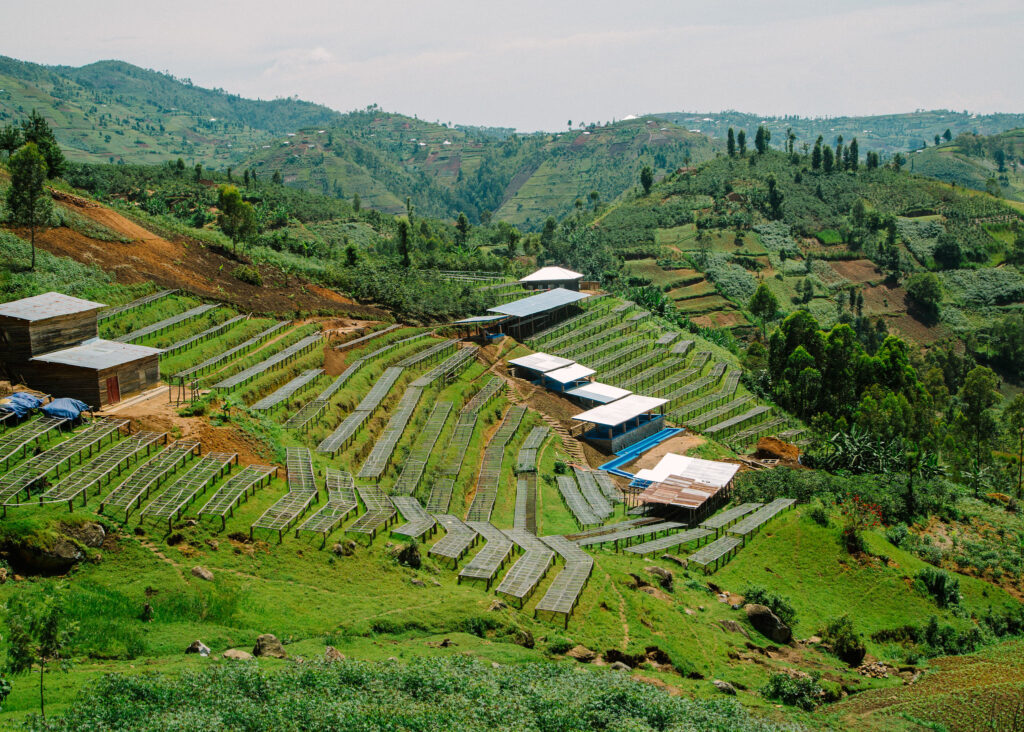
الحصاد وما بعد الحصاد
يتم قطف الكرز بعناية لإزالة أي كرز تالف أو غير ناضج. لا تقبل محطات الغسيل سوى الكرز الناضج تمامًا، لذا يحرص المزارعون على التأكد من قبول أقصى كمية من الكرز.
يتم تعويم الكرز لإزالة تلك التي بها أضرار حشرية أو منخفضة الكثافة. يتم تقشير الكرز ثم تخميره بالماء لمدة 24 ساعة لإزالة المادة المخاطية المتبقية. بعد اكتمال التخمير، يتم إرسال الرق من خلال قنوات الفرز لفصله إلى ثلاثة مستويات من الكثافة (A1 وA2 وA3). أخيرًا، يتم نقع الرق لمدة 20 ساعة تقريبًا لتحسين الجودة ومدة الصلاحية وإزالة أي مادة مخاطية متبقية.
بعد الغسيل، يتم إخراج الرق من الماء ونقله إلى طاولات التجفيف المسبق لفرزه يدويًا. غالبًا ما يكون من الأسهل اكتشاف العيوب عندما يكون الرق لا يزال رطبًا. بعد هذه العملية، يتم وضع الرق على الطاولات لتجفيفه في الشمس حيث يتم أيضًا فرزه باستمرار لإزالة أي عيوب متبقية.
القهوة في رواندا
على الرغم من تاريخها المضطرب، أصبحت رواندا اليوم واحدة من الدول المفضلة في عالم القهوة المتخصصة - لسبب وجيه! تقوم شركتنا الشقيقة في رواندا بعمل مذهل في تقديم أفضل ما تقدمه رواندا لمحمصي القهوة في جميع أنحاء العالم.
جلب المبشرون والمستوطنون الألمان القهوة إلى رواندا في أوائل القرن العشرين. وتم تأسيس إنتاج القهوة على نطاق واسع خلال ثلاثينيات وأربعينيات القرن العشرين من قبل الحكومة الاستعمارية البلجيكية. واستمر إنتاج القهوة بعد رحيل المستعمرين البلجيكيين. وبحلول عام 1970، أصبحت القهوة أكبر صادرات رواندا ومثلت 70٪ من إجمالي عائدات التصدير. كانت القهوة تعتبر ذات قيمة كبيرة لدرجة أنه اعتبارًا من عام 1973، أصبح من غير القانوني اقتلاع أشجار القهوة من الأرض.
بين عامي 1989 و1993، تسبب انهيار اتفاقية البن الدولية في انخفاض الأسعار العالمية. وتضررت الحكومة والاقتصاد الرواندي بشدة من انخفاض أسعار البن العالمية. أدت الإبادة الجماعية عام 1994 وما تلاها إلى انهيار كامل لصادرات البن وإيرادات الدولار الأمريكي الحيوية، لكن المرونة المذهلة للشعب الرواندي واضحة في الطريقة التي تعافى بها الاقتصاد والاستقرار منذ ذلك الحين. تعتبر رواندا الحديثة واحدة من أكثر البلدان استقرارًا في المنطقة. منذ عام 2003، نما اقتصادها بنسبة 7-8٪ سنويًا ولعب إنتاج البن دورًا رئيسيًا في هذا النمو الاقتصادي. كما لعب البن دورًا في التقدم الكبير الذي أحرزته رواندا نحو المساواة بين الجنسين. لقد أدت المبادرات الجديدة التي تلبي احتياجات النساء وتركز على مساعدتهن في تجهيز أنفسهن بالأدوات والمعرفة اللازمة للزراعة إلى تغيير الطريقة التي تنظر بها النساء إلى أنفسهن وتتفاعل مع العالم من حولهن.
اليوم، يدفع صغار المزارعين الصناعة في رواندا إلى الأمام. لا توجد في البلاد أي مزارع كبيرة. يزرع معظم البن أكثر من 400 ألف مزارع صغير، يمتلكون أقل من ربع هكتار. غالبية إنتاج البن في رواندا من أرابيكا. تشكل نباتات صنف بوربون 95% من جميع أشجار البن المزروعة في رواندا.
